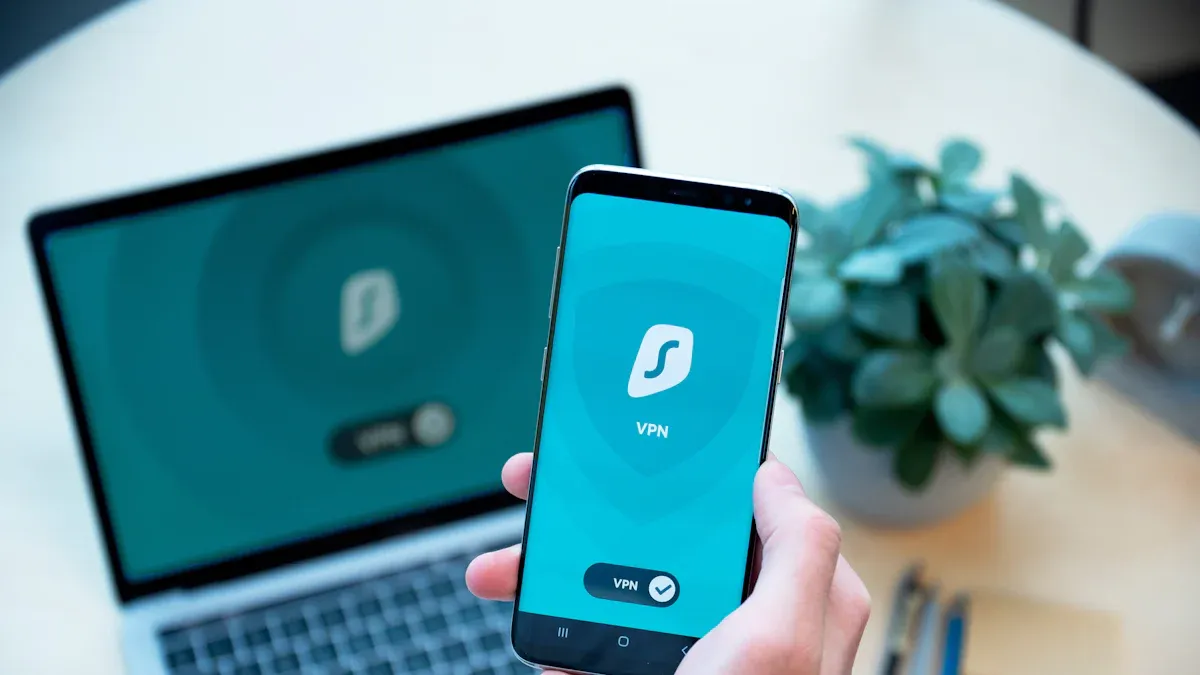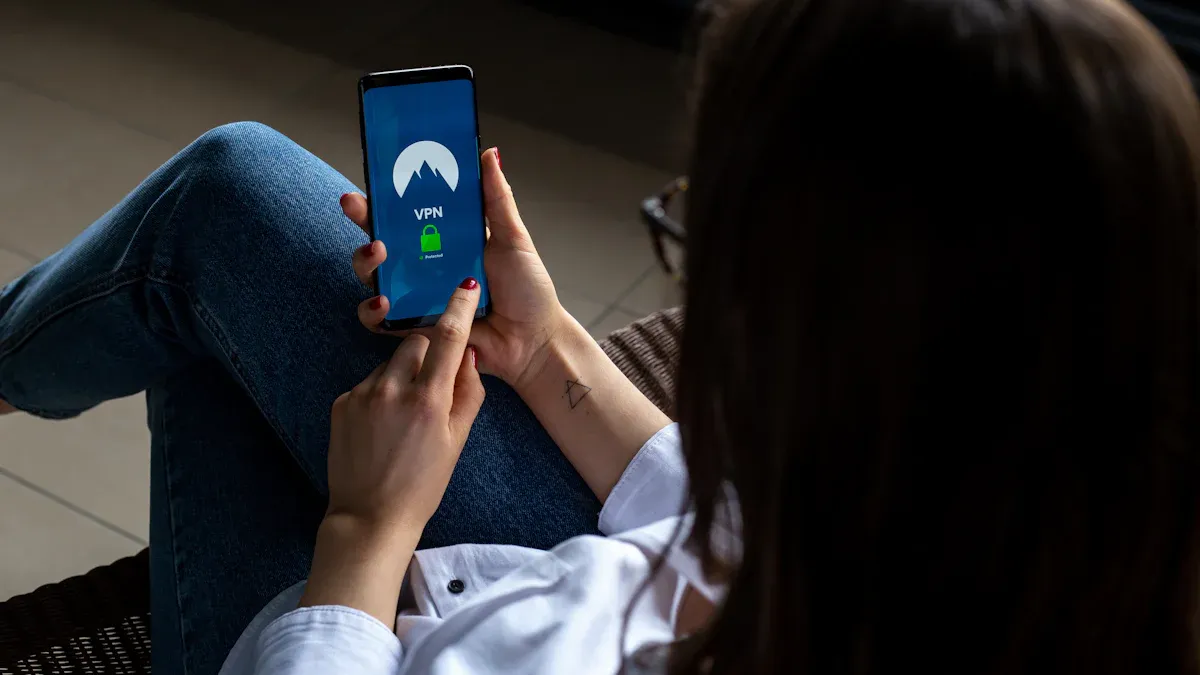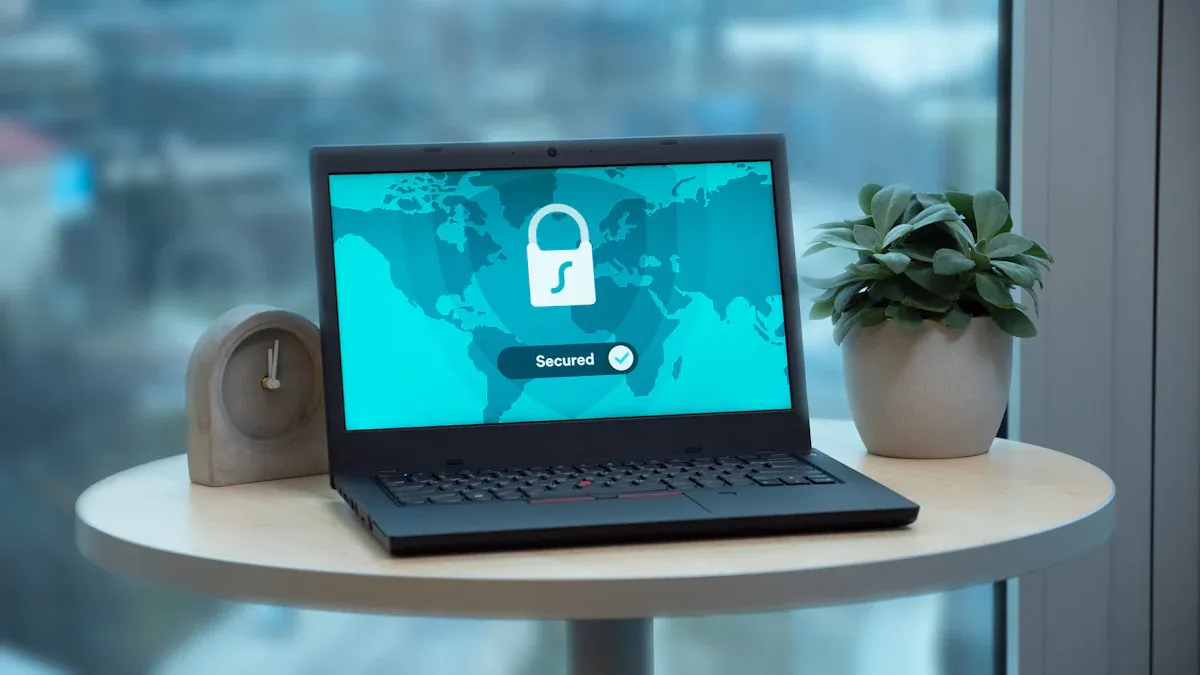
Mobile devices are now a big part of daily life. They store photos, contacts, and even private financial details. By 2025, over 4.69 billion people will own smartphones. People spend about 4 hours a day online using them. This heavy use makes phones a big target for hackers.
The dangers of weak mobile security are increasing fast. Many data leaks happen because of phone weaknesses. About 25% of tested apps have serious problems. Over half of Android phones use old, unsafe software. These issues can lead to stolen data, identity theft, and loss of privacy.
You can keep your data safe by taking smart steps. Use strong passwords, update your phone often, and try services like Vertu information security protection services to protect your information.
Key Takeaways
-
Phones store important personal information. Use strong passwords and fingerprint locks to keep it safe.
-
Update your phone and apps often. Updates fix problems and stop hackers.
-
Be careful with free Wi-Fi. Don’t use important accounts on public networks. Use a VPN for extra safety.
-
Download trusted security apps. They block bad apps and stop scams.
-
Learn about phone security risks. Knowing scams and dangers helps protect your information.
Why Mobile Security is Important
Keeping your personal data safe from breaches and theft
Your phone holds lots of personal information, like photos and messages. It also stores private details, such as bank information. Without good security, hackers can easily steal this data. Data breaches are happening more often now. In 2022, there were 1,774 reported breaches. These leaks exposed names, emails, and passwords. This puts people at risk of identity theft and losing money. A single data breach costs about $4.35 million, showing how serious it can be.
Hackers like targeting phones because they connect to public Wi-Fi. Places like coffee shops and airports often have unsafe networks. Hackers can steal your data through these connections. Many phones also use old software without security updates. Updating your phone and using safe networks can help protect your data.
Protecting personal data in a digital world
Today, your personal data is always at risk online. Free apps are more likely to track your data than paid ones. About 72.6% of iOS apps collect private user information. Even trusted apps might not keep your data safe. Only a small number of Americans feel in control of their online privacy. This shows why mobile security is so important.
You can protect your data with strong passwords and two-factor authentication. Trusted security apps also help block hackers. These tools stop others from accessing your private information. For example, mobile security can stop phishing scams. These scams trick people into sharing sensitive details. By using these tools, you can better protect your privacy.
How mobile security helps prevent identity theft
Identity theft is a big problem, but mobile security can help. Hackers often steal personal data from phones to commit fraud. Weak security in apps makes it easier for them to do this. Features like facial recognition and fingerprint scans reduce fraud. In 2022, biometric tools like selfies helped lower identity theft cases.
Companies are improving security to fight fraud. They add features like facial recognition to make hacking harder. You can help by turning on biometric security on your phone. This adds extra protection, making it harder for others to access your data. Simple steps like this can keep your personal information safe.
Common Threats to Mobile Security

Malware and harmful apps stealing personal data
Malware and bad apps are big mobile threats. These programs can steal your data, invade privacy, or take your money. Hackers hide malware in fake apps to trick people. In 2023, one in 36 phones had risky apps. Over 500,000 harmful apps were found in third-party stores. Shockingly, 75% of apps fail basic safety checks, putting your data at risk.
Phones are easy targets because they hold private details. Hackers use old apps and weak security to break in. To stay safe, don’t download apps from unknown places. Also, keep your phone’s software updated.
Phishing scams and fake links
Phishing scams are another big danger for phones. These scams trick you into clicking fake links or sharing private info. In 2024, 82% of phishing sites aimed at phone users. Many fake sites use HTTPS to seem safe. Half of phishing attacks happen outside email, like in texts or social media.
Hackers make fake websites or send fake messages. Clicking these links can give them your passwords or bank info. To stay safe, check messages or links before clicking. Security apps can also block phishing attempts.
Dangers of public Wi-Fi
Public Wi-Fi can be risky for your phone’s safety. Hackers use fake hotspots to trick people into connecting. They can then spy on your internet activity. Some hackers use packet sniffing to steal private info, like passwords, from Wi-Fi signals.
Public Wi-Fi is handy but unsafe. Hackers can use it to install spyware or ransomware. They may also create fake hotspots, called evil twins, to steal data. To protect yourself, avoid using public Wi-Fi for private tasks like banking. If you must use it, a VPN can keep your data safe.
Device theft and unauthorized access to sensitive information
Losing your phone can lead to big problems. Phones hold private data like passwords, bank info, and photos. If stolen, someone could misuse this information. Hackers may use stolen phones for cyber attacks or sell data online.
Without good security, it’s easier for thieves to break in. Many people don’t use strong passwords or biometric locks. This makes stolen phones easy to unlock. Over 80% of apps have at least one security issue. Hackers use these flaws to steal private information.
Mobile malware is becoming a bigger problem every year. From 2019 to 2020, malware cases rose by 46%. Ransomware attacks on phones jumped by 118% in the same time. These numbers show why securing your phone is so important. The table below shows more details:
|
Problem Description |
Percentage Increase |
|---|---|
|
Mobile malware cases from 2019 to 2020 |
46% |
|
Cyberattacks from phishing emails/messages |
>90% |
|
Rise in mobile ransomware attacks in 2020 |
118% |
|
Apps with at least one security problem |
>80% |
To stay safe, lock your phone with a strong password or biometrics. Don’t keep sensitive data on your phone unless needed. If your phone is stolen, report it fast and erase your data remotely. These actions can help protect your personal information.
Best Practices for Protecting Your Personal Data

Use strong passwords and enable biometric authentication
Strong passwords are key to keeping your data safe. Use a mix of letters, numbers, and symbols. Avoid using easy-to-guess details like your name or birthday. Instead, create unique passwords that are hard to figure out. For example, Tr3e$@2023 is much safer than password123.
Biometric locks, like fingerprints or face scans, add extra security. These features make it harder for others to unlock your phone. They are also easy to use since you don’t need to remember passwords. Together, strong passwords and biometrics protect your phone from hackers.
Biometric tools are both safe and simple to use. They lower the chances of someone breaking into your phone. When paired with a strong password, they keep your personal data secure.
Enable two-factor authentication (2FA) for added security
Two-factor authentication (2FA) makes your accounts safer. It uses two steps to confirm your identity, like a password and a code sent to your phone. Even if someone steals your password, they can’t log in without the second step.
2FA has many benefits:
-
It lowers the risk of stolen passwords.
-
It reduces money loss from data leaks.
-
It blocks phishing and hacking attempts.
Turning on 2FA adds strong protection to your accounts. Many apps, like email and social media, offer this feature. Setting it up is quick and helps stop mobile threats.
Regularly update your device’s software and apps
Old software makes it easier for hackers to attack. Updates fix security problems and improve how your phone works. Skipping updates leaves your phone open to malware and scams.
Check for updates often or turn on automatic updates. This way, your phone always has the latest security fixes. Updating apps is just as important. Many apps hold private data, and old versions may have weak spots.
Keeping your phone and apps updated is vital for safety. It lowers the chance of cyberattacks and protects your data. Use security apps too for even better protection.
Install trusted mobile security software
Adding good security software is a smart way to protect your phone. This software works like a guard, stopping bad apps, viruses, and fake links before they harm your data. Many security tools also include features like live scanning, anti-theft options, and safe browsing settings.
Pick security software from well-known brands with good reviews. Avoid free or unknown programs, as they might miss key features or even be unsafe. Some security tools come with mobile device management (MDM) features. These are helpful for businesses to secure and manage many devices, keeping private data safe.
Tip: Turn on automatic updates for your security software. This keeps it ready to fight new threats.
Don’t download apps from unsafe places
Apps from unofficial sites can be dangerous. Hackers use these sites to hide malware in fake apps. Once downloaded, these apps can steal your data, track you, or lock your phone for money.
Stick to trusted app stores like Google Play or the Apple App Store. These stores check apps for safety to lower risks. Before downloading, read reviews, check permissions, and look at the developer's details. If something feels off, don’t download it.
Note: Even apps from trusted stores can have problems. Security software can help find and block these risks.
Be careful with public Wi-Fi
Public Wi-Fi is handy but often unsafe. Hackers can spy on your data, stealing passwords or bank details. Some even set up fake Wi-Fi spots to trick people into connecting.
To stay safe, avoid logging into private accounts or doing money tasks on public Wi-Fi. If you must use it, get a virtual private network (VPN). A VPN scrambles your data, making it harder for hackers to steal. Many security apps include VPN features for full protection.
Reminder: Turn off your phone’s auto Wi-Fi connection. This stops it from joining unsafe networks without you knowing.
VERTU Information Security Protection Services
Overview of VERTU’s Ruby Key as a luxury mobile security solution
The Ruby Key by VERTU is a top-notch way to protect your personal data. It combines high-end technology with a stylish design. Each Ruby Key is carefully made in England, showing the brand's focus on quality. The ruby button, weighing 4.75 carats, is not just fancy but also unlocks strong security features.
The back of the device is built with a tough material called Physical Vapour Deposition (PVD). This makes it strong enough to handle tough conditions while keeping its elegant look. VERTU information security protection services focus on keeping your data private while offering a mix of safety and style.
How the Ruby Key enhances personal data protection
The Ruby Key uses advanced encryption to keep your data safe from hackers. It limits who can decrypt your data, so only trusted systems can access it. With asymmetric encryption, data is locked with a public key and unlocked with a private key, adding extra safety.
It also tracks who accesses your data, helping you spot any problems. Key management services (KMS) make security even better by handling encryption keys and permissions. These tools work together to protect your personal data from being stolen.
Additional benefits of the Ruby Key for safeguarding sensitive information
The Ruby Key has extra features that make it a great security choice. It regularly updates encryption keys to lower the risk of hacking. Only certain people or systems can access sensitive data, reducing the chance of attacks.
It also keeps a record of who views your data and when, which helps with audits. These features, along with its luxury design and smart technology, make the Ruby Key perfect for those who want both safety and style.
Tip: The Ruby Key is more than just a security gadget. It’s a stylish upgrade that protects your data while giving you exclusive benefits.
The Importance of Awareness in Mobile Security
Spotting phishing scams and suspicious behavior
Phishing scams are a big mobile security threat. Hackers pretend to be trusted people or companies. They trick you into sharing private information. These scams can show up as emails, texts, or social media links. Learning to spot them is key to staying safe. For example, fake emails or practice scenarios can teach people to notice scams. Tools like Hoxhunt make learning fun and help users practice spotting phishing tricks.
To protect yourself, always check who sent the message. Don’t click on links that seem strange. Watch for bad grammar, urgent messages, or odd web addresses. If something feels wrong, trust your gut and double-check before acting.
Learning about new mobile security dangers
Mobile security risks keep changing. Hackers find new ways to attack phones and apps. For example, some apps ask for too many permissions. Old software can also leave your phone open to attacks. Public Wi-Fi and weak passwords make things worse. In 2024, over 17 million harmful websites were blocked, showing how big the problem is.
Staying updated helps you handle these risks. Read news from trusted cybersecurity sites. Learn about new dangers like IoT hacks or mobile phishing scams. Knowing these risks helps you take steps to protect your phone and data.
Helping friends and family stay secure
Your good habits can inspire others to stay safe online. Share tips like using strong passwords and turning on two-factor authentication. Remind them to avoid public Wi-Fi for private tasks. Talk about spotting phishing scams and keeping devices updated. Simple talks can help spread awareness.
Suggest tools like security apps or VPNs to improve their safety. By sharing what you know, you help create a safer online world for everyone.
Mobile security is key to keeping your personal data safe. Simple actions like updating software and using strong passwords help. Advanced tools, like encryption, also protect against hackers and data theft.
Following smart habits makes it harder for threats to harm you. Tools like VERTU’s Ruby Key provide strong security and style. By learning about risks and staying alert, you can protect your private information and feel secure in the digital age.
FAQ
What is mobile security, and why is it important?
Mobile security keeps your phone and data safe from hackers, malware, and phishing. It’s important because phones store sensitive things like passwords, bank info, and personal pictures. Without good security, you could lose data or face identity theft.
How do I know if an app is safe to download?
Look at the app’s reviews, ratings, and developer details. Only download from trusted stores like Google Play or the Apple App Store. Avoid apps with very few downloads or strange permissions. Security apps can also warn you about unsafe apps before installing them.
Is public Wi-Fi always risky?
Public Wi-Fi can let hackers steal your data. They might use fake networks or watch what you do online. Don’t log into private accounts or do money tasks on public Wi-Fi. Use a VPN to scramble your data and stay safe when using public networks.
What should I do if my phone is stolen?
Use a “Find My Device” feature to lock your phone remotely. If you can’t get it back, erase your data. Report the theft to your phone company and the police. Set strong passwords and use biometric locks to make it harder for thieves to access your phone.
How does VERTU’s Ruby Key make mobile security better?
The Ruby Key uses strong encryption to protect your data. It only allows trusted systems to access your information and tracks who views it. With key management and regular updates, it keeps your data safe while offering a stylish experience.
Tip: Combine the Ruby Key with smart security habits for the best protection.








